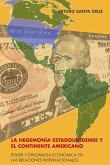Guided by Gramsci's question of why so many victims support the labyrinth of their oppression, Robert A. Williams queries garrison state machinations in electioneering to promote hegemony. This pioneering ethnography explores the role and function of the U.S. garrison state in U.S. electioneering through participant observation of the United States's largest third party-the Libertarian Party (LP)-as a window to wider sociocultural dynamics of covert power in U.S. politics. Some three decades of insider membership roles within Libertarian Party electioneering combined with two years of doctoral fieldwork provide an ethnographic window into cultural hegemony in U.S. electoral politics and sociological analysis of the information warfare that sustains it.
Anchored in original and extensive participant observation including interviews and surveys, this ethnography of United States's sociologically understudied Libertarian Party (LP) probes the power of cultural hegemony to constrain human agency in electioneering. Through a privileged membership point of view by becoming the phenomenon, the author provides a critically reflective analysis of the sociocultural context in which LP electioneering unfolds. Membership roles in Libertarian electioneering range from donors to candidates, from volunteers to party officials, and from anti-authoritarian libertarians to authoritarian conservatives. Exploring its transition from a radical anti-establishment party to a party more in line with mainstream opinion, Williams shows how a member's relations of shared cultural logics constrain her or his behavior to ultimately reproduce garrison state social practices.
Anchored in original and extensive participant observation including interviews and surveys, this ethnography of United States's sociologically understudied Libertarian Party (LP) probes the power of cultural hegemony to constrain human agency in electioneering. Through a privileged membership point of view by becoming the phenomenon, the author provides a critically reflective analysis of the sociocultural context in which LP electioneering unfolds. Membership roles in Libertarian electioneering range from donors to candidates, from volunteers to party officials, and from anti-authoritarian libertarians to authoritarian conservatives. Exploring its transition from a radical anti-establishment party to a party more in line with mainstream opinion, Williams shows how a member's relations of shared cultural logics constrain her or his behavior to ultimately reproduce garrison state social practices.
"As the Libertarian Party turns 50, Robert A. Williams provides a critical historical account and eye-opening ethnography of hegemonic cultural trends affecting all parties in the United States while tracing the role of the military/industrial complex in their generation. His book is an insightful contribution to anthropology, political science, sociology, and U.S. history."-Kwaku Obosu-Mensah, Author of Ghana's Volta Resettlement Scheme: The Long-Term Consequences of Post-Colonial State Planning and Food Production in Urban Areas: A Study of Urban Agriculture in Accra, Ghana








